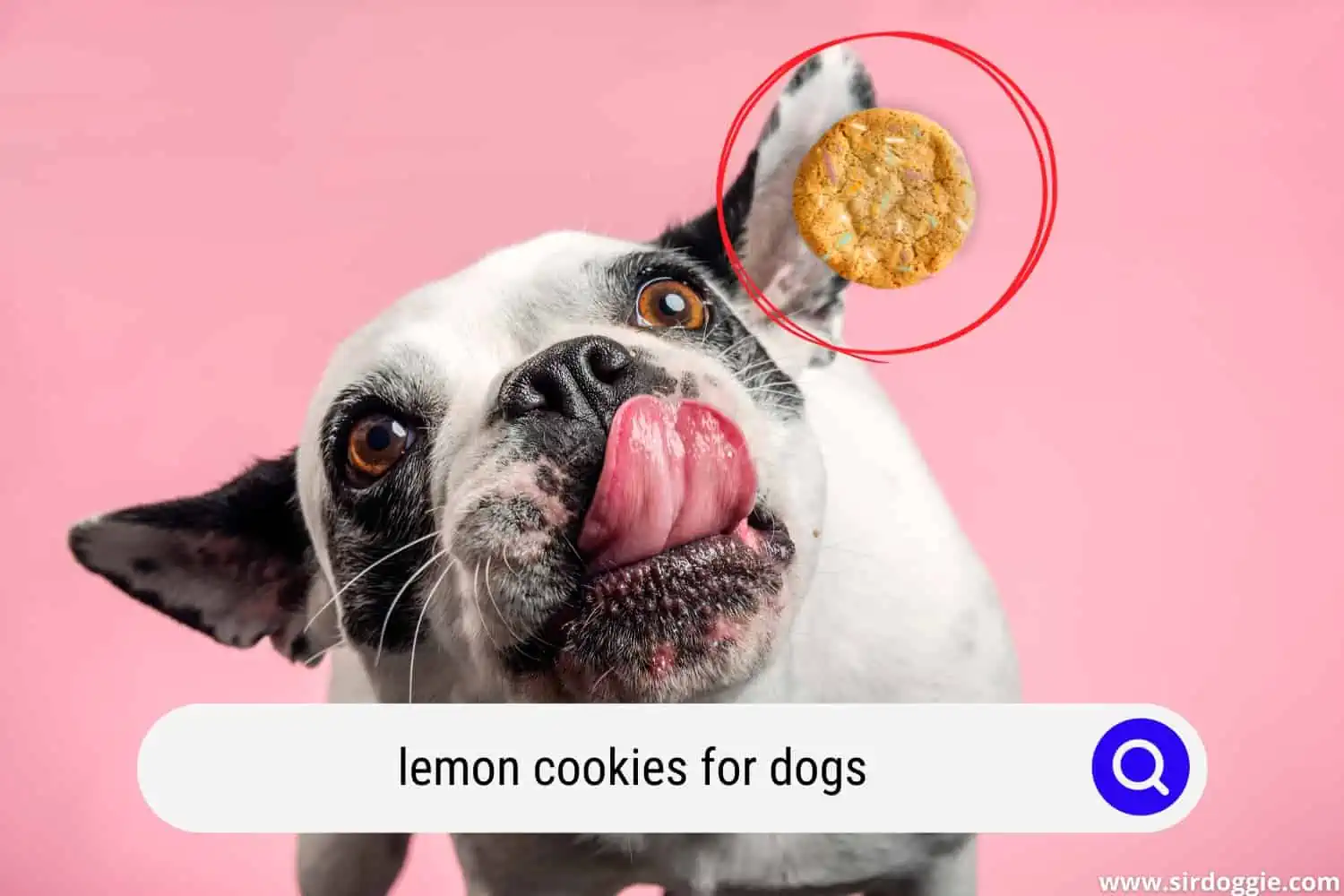Can Dogs Have Lemon Cookies?
The majority of dog owners are highly conscious of what they feed their dogs. However, a pet parent’s desire to feed their dog healthily most of the time often still doesn’t stop them from giving their pets human food, including different types of snacks, veggies, fruits, and even cookies.
Due to a significant amount of variation among different types of cookies, pet parents are often curious about giving lemon cookies to dogs. So, can dogs have lemon cookies, or would it be unsafe?

Lemon cookies are considered a great cookie option for humans wanting a snack, but they are not good for our furry friends to consume. It is advised that you never give your dog lemon cookies or any other items containing lemon. Lemon (along with other citrus fruits) contains citric acid and psoralen compounds, both of which are toxic to dogs when consumed in large quantities.
Lemons are typically a food you want to avoid allowing your dog to eat or even consume on accident. The excess amount of lemon found in lemon cookies would be completely prohibited. Because all of the other ingredients that are used to make lemon cookies—such as flour, butter, oil, and so on—are completely unnecessary and harmful to the dog’s health and well-being, it’s best to avoid letting your dog eat these, whether by accident or by you intentionally letting them try one.
Lemon cookies are toxic to dogs and can cause various health problems, including diarrhea, vomiting, weight gain, and skin allergies if fed to them. With this being the case, it’s safest to just entirely avoid feeding your pup any type of lemon snack for the sake of their health.
Related Reading: Can Dogs Have Sunflower Butter? To Give Or Not To Give
What’s the Deal with Dogs and Lemons/Lemon Cookies?
Lemons—and, thereby, lemon cookies—contain Vitamin C, and this vitamin is usually known for being incredibly helpful and beneficial, so why are dogs harmed when they consume lemons in large quantities?
Lemons also contain linalool, limonene, and a phototoxic (skin-irritant) compound known as psoralen, all of which are found in citrus fruits in general. Even though dogs can tolerate small amounts of lemon flesh or lemon juice, ingesting large quantities of citrus fruit can result in poisoning.
Symptoms of canine lemon poisoning include the following:
- Diarrhea
- Depression
- Lethargy
- Drooling (excessive)
- Hypertension
- Cold limbs
- Rashes or inflammation of the skin
- Vomiting
- Weakness
- Tremors
- Liver failure
If you believe your dog has swallowed lemons, a significant amount of lemon juice, or multiple lemon cookies and he or she is exhibiting any of the symptoms listed above, it is recommended to take them to the veterinarian immediately for further evaluation.
If your dog unintentionally consumes some lemon cookies, health issues will most certainly occur, so this is a serious concern. If you do not seek medical attention as soon as possible, your dog may die from the side effects of the lemons’ citric chemicals.
Why are Lemon Cookies Harmful to Dogs?
The consumption of lemon cookies is harmful to dogs for several reasons, and it is essential to understand why this is the case for dogs. Here are some of the ingredients that are unhealthy for canines and can lead to significant health conditions requiring medical attention from a veterinarian.
Flour
Flour is used to produce a variety of cookies, all of which are harmful to the health of your dog’s digestive system. There is no doubt that the use of wheat will induce numerous digestive issues in a dog, and this may result in your dog being reluctant to consume any other meals.
Additionally, when dogs consume excessively fatty diets, they develop skin allergies. Many baked goods tend to be overall unhealthy choices and will impact your dog’s health quite negatively. Eating lemon cookies, as well as many other types of human sweets, can cause stomach aches, bloating, and various other issues in your pet dog.
Sugar
Lemon cookies are also made with sugar, which is another detrimental ingredient. Sugar is known to cause weight gain in dogs, and this can lead to a lot of health problems such as joint issues and further internal concerns, along with also being suspected of causing behavioral issues if consumed regularly.
Eating sugar raises the risk of diabetes and renal disease in dogs. It is also closely related to obesity in dogs, and it is also hazardous to their teeth as well. As a result, sugar plays a significant part in why lemon cookies are often considered to be harmful to our canine buddies.
Lemon Juice or Lemon Zest
You should avoid giving your dog lemon juice due to the potential risks. If he or she were to come into contact with it, it may not cause immediately problematic side effects in small amounts, but it will likely still irritate (whether this is to their stomachs or their skin).
It’s a general rule that you should never feed your dog any treat that contains lemon zest since it contains even more oils and chemical compounds that are harmful to dogs—more than what lemon juice by itself contains—and can cause rashes and skin irritation if consumed.
Vanilla Extract
The majority of vanilla extracts available on the market have a high concentration of alcohol, and any type of alcohol is extremely hazardous for dogs. Because dogs are unable to break down alcohol in their bodies, if your dog swallows an excessive amount of any extract, he or she can suffer from alcohol poisoning.
Butter/Oil
Lemon cookies are also made with butter and/or oil as a binding agent. Most pet parents are well aware that butter can cause major digestive issues in dogs.
Dogs who consume excessive amounts of butter can also develop pancreatitis, which comes with several unpleasant symptoms and will require treatment by their veterinarian. Any significant amount of oils and fats in their diet will also impact their weight and lead to further complications.
The Verdict Regarding Lemon Cookies for Dogs
The majority of the components in lemon cookies are not very healthy or nutritious for dogs, and several of them might cause health problems if consumed in large amounts. To avoid taking any chances with your pet’s health, it’s a wise decision to provide them with treats that have been scientifically balanced and made just for pets.
What Should I Give My Dog Instead?
Some human snacks have more natural ingredients and may be safe for them to consume in small amounts, but in general, it’s best if you stick to only giving your dog treats that have been specifically designed for them. There are plenty of options online and in most pet stores for dogs who have certain health needs, prefer certain flavors, or even have specific dietary requirements that may limit them.
It may seem nice to share some of our human food with our closest companions, but we’re not doing them any favors nor doing what’s best for them when giving them processed and unhealthy human foods.

FAQs
What kinds of cookies are safe for dogs to eat?
If your dog has stolen a sugar cookie or similar treat that is rich in sugar, butter, and wheat but does not contain any other significant dog-harming ingredients, that cookie is unlikely to be hazardous to them. However, it is still technically bad for your dog to consume treats like this, so try to ensure your pup won’t find any of these cookies on the floor or reach up to the counter to grab some. Although refined sugar is not the ideal choice for your pet, your dog will likely be alright with occasionally sneaking and consuming it behind your back.
Is it safe to feed lemon cake to dogs?
If your dog eats a little piece of lemon cake, it is unlikely that it would cause any major harm, but it would be wise to keep an eye on them to make sure they don’t exhibit any concerning symptoms from eating such a sweet, oily, and lemon-filled dessert. It is not recommended for dogs, and excessive consumption will very likely cause stomach trouble. In addition to the fact that your dog should not consume cake regularly, the prominent ingredient of lemon adds to the harm that this sweet will cause to your beloved pup.
Can dogs eat peanut butter cookies?
Normal peanut butter is completely fine to give your dog as a treat, and the more natural and sugar-free, the better. The worst culprit with certain nut butter is xylitol, a sugar substitute that is often found in low-calorie and sugar-free goods. As long as the peanut butter you give to your dog does not include xylitol, your canine companion will be delighted. However, be cautious of the fat content and overall sugar content to avoid causing your dog to gain weight or incur any digestive distress if they were to consume too much.
Can dogs eat oatmeal raisin cookies?
No. Oatmeal is acceptable (and even beneficial) for dogs, but oatmeal cookies have extra sugar, which dogs should avoid. Additionally, when it comes to cookies, if they contain chocolate or raisins, you should certainly avoid giving them to your dog because both substances are incredibly harmful to them and should be avoided at all costs.
What should I do if my dog consumes sugar cookies?
If your dog consumes one of your sugar cookies, urge him or her to drink plenty of water, and continue to feed him as you regularly do. Keep a watchful eye on your companion to look for any symptoms of an allergic reaction or any major stomach trouble. If anything serious occurs, take your canine companion to the veterinary doctor as soon as possible.
Related Reading: Can Dogs Eat Goldfish Crackers? Here Is An Answer!

Family Dog Expert Author
Hi there! I’m Stuart, a devoted dog lover and family dog expert with over a decade of experience working with our furry companions. My passion for dogs drives me to share my knowledge and expertise, helping families build strong, loving bonds with their four-legged friends. When I’m not writing for SirDoggie, you’ll find me hiking, playing with my beautiful dog, or studying music.